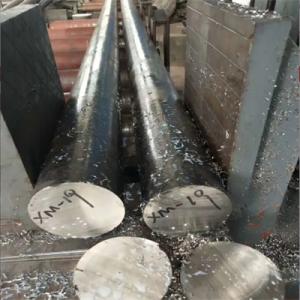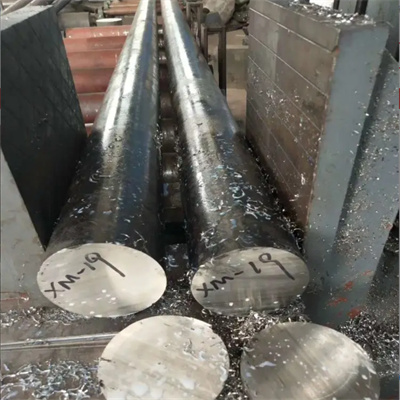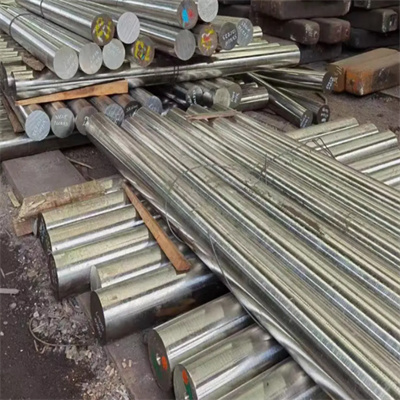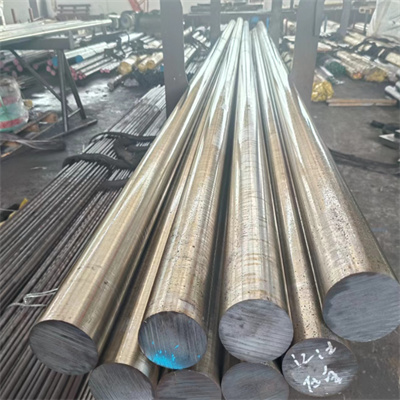Corrosion resistance of Super13cr stainless steel round steel for drilling tools
- Loading Port:
- XINGANG
- Payment Terms:
- TT OR LC
- Min Order Qty:
- 1 kg
- Supply Capability:
- 1000 kg/month
OKorder Service Pledge
OKorder Financial Service
You Might Also Like
Specification
Corrosion resistance of Super13cr stainless steel round steel for drilling tools
Super13Cr is a martensitic stainless steel with good corrosion resistance and excellent strength, mainly used in offshore oil projects, OTG pipelines, casings, and underground projects. It is a super stainless steel that improves its strength and hardness, as well as toughness, by reducing the carbon content (carbon content is 0.03%) and increasing the nickel content (4.5-5.5%) and molybdenum content (1.5-2.5%). This material overcomes the shortcomings of traditional martensite such as poor stress crack sensitivity and poor weldability during welding, and therefore has higher corrosion resistance and better welding performance. Super13Cr has a wide range of applications, including but not limited to automotive, metal products, precision electronics, mechanical manufacturing, pressure vessels, chemical equipment, etc.
Stainless steel round steel belongs to the category of long materials and also to the category of rods. The so-called stainless steel round steel refers to long materials with a uniform circular cross-section, generally about four meters long. It can be divided into light circles and black bars. The so-called light circle refers to a smooth surface that has undergone quasi rolling treatment; The so-called black rod refers to a surface that is black and coarse, directly hot-rolled.
Stainless steel round steel has the following characteristics:
1. Corrosion resistance: Stainless steel round steel can resist rusting and corrosion in media such as atmosphere, water, acid, and alkali, and has good corrosion resistance. It can maintain surface brightness and color change.
2. High temperature resistance: Stainless steel round steel can still maintain good stability in high temperature environments, without deformation, softening, or cracking, and can be used in high-temperature situations.
3. High strength: Stainless steel round steel has a compact and strong structure, excellent mechanical properties, and can be used under harsh conditions such as high strength and high pressure.
4. Convenient processing: Stainless steel round steel can be processed in various ways, such as welding, cutting, drilling, punching, etc. It can be customized according to actual needs.
Buyer Reading
All products in our store are photographed from real objects, with slight color differences in the pictures. For any product issues, please contact our merchant's after-sales service for assistance! The prices of our products are for reference only. There are many models in different series and prices may vary. Please consult the merchant before placing an order.
Products need to be customized in advance (such as non-standard production and processing). Please consult the merchant before placing an order to see if there is stock available. If customization is required, please confirm the order deadline (to avoid delaying your urgent needs).
- Q: What are the advantages of using zinc-alloy steel round bars?
- One of the advantages of using zinc-alloy steel round bars is their high corrosion resistance. The zinc coating acts as a protective barrier, preventing rust and corrosion, which makes these bars suitable for outdoor applications and environments with high humidity. Additionally, zinc-alloy steel round bars have excellent strength and durability, making them ideal for structural and load-bearing purposes. Furthermore, the zinc coating provides enhanced aesthetics, offering a polished and visually appealing finish. Overall, the advantages of using zinc-alloy steel round bars include corrosion resistance, strength, durability, and improved appearance.
- Q: What are the advantages of using nickel-chromium-aluminum alloy steel round bars?
- There are several advantages of using nickel-chromium-aluminum alloy steel round bars. Firstly, this type of alloy steel offers excellent strength and toughness, making it suitable for applications that require high resistance to corrosion, heat, and oxidation. Secondly, the inclusion of nickel and chromium enhances the alloy's ability to withstand extreme temperatures, making it ideal for use in environments with high heat or pressure. Additionally, the aluminum content promotes good formability, allowing for easier machining and fabrication. Lastly, the nickel-chromium-aluminum alloy steel round bars exhibit good weldability, making them versatile and easy to work with in various industries such as aerospace, automotive, and manufacturing.
- Q: What are the advantages of using nickel-chromium-molybdenum alloy steel round bars?
- Nickel-chromium-molybdenum alloy steel round bars offer numerous benefits: 1. Exceptional strength and durability: These round bars possess outstanding mechanical properties, including high tensile strength and hardness. As a result, they are ideal for applications that demand robust and long-lasting materials. 2. Enhanced resistance to corrosion: The inclusion of nickel and chromium in the alloy steel composition improves its ability to withstand corrosion. This makes it suitable for use in environments exposed to harsh chemicals or moisture. Consequently, the lifespan of these round bars is extended, reducing the need for frequent replacements. 3. Impressive heat resistance: Nickel-chromium-molybdenum alloy steel round bars can endure high temperatures without compromising their structural integrity. This makes them well-suited for applications involving extreme heat, such as the manufacturing of boilers, heat exchangers, and other heat-resistant equipment. 4. Versatility in fabrication: These round bars can be easily machined and fabricated, enabling the production of various shapes and sizes. This versatility makes them applicable across a wide range of industries, including aerospace, automotive, oil and gas, and construction. 5. Resistance to fatigue: The alloy composition of nickel-chromium-molybdenum steel enhances its resistance to fatigue, making it ideal for applications subjected to cyclic loading or repeated stress. This ensures that the round bars can withstand prolonged use without experiencing fatigue failure. 6. Excellent weldability: Nickel-chromium-molybdenum alloy steel round bars exhibit good weldability, facilitating easy joining or fabrication processes. This makes them suitable for applications that require welding or other forms of joining, providing flexibility in design and construction. In conclusion, the advantages of nickel-chromium-molybdenum alloy steel round bars make them a preferred choice in industries where strength, durability, corrosion resistance, heat resistance, versatility, fatigue resistance, and weldability are crucial factors for success.
- Q: Is there any technique for welding round steel?
- Welding skills:2.1, to determine the best welding position, the group of good welding flat, easy to rotate welding, the weld pool is always in flat position, note the rod angle at 70 degrees.2.2, the welding workpiece in continuous continuous rotation, to control the size of the weld pool at the end of each lap weld slag, cleaned, and then welding together, the thickness of each layer is about 2mm, until the full fill slope has so far.
- Q: Can steel round bars be used for making tie rods?
- Yes, steel round bars can be used for making tie rods. Steel round bars are commonly used in construction and engineering applications due to their strength and durability. Tie rods are used to provide structural support and stability, and steel round bars are well-suited for this purpose. They have high tensile strength and can withstand heavy loads and tension, making them an ideal choice for tie rods. Additionally, steel round bars can be easily fabricated and welded, allowing for customization and versatility in the design and construction of tie rods.
- Q: What is the maximum vanadium content allowed for steel round bars?
- The allowed vanadium content in steel round bars varies depending on the specific steel grade and industry standards, with different regulations or customer requirements for different steel grades and applications. Vanadium is commonly used as an alloying element in steel to enhance its strength, hardness, and corrosion resistance. Generally, the maximum vanadium content in steel round bars falls between 0.02% and 0.25%. To determine the maximum allowed vanadium content for steel round bars, it is essential to consult the relevant standards and specifications for the specific steel grade and application.
- Q: Can steel round bars be used in the manufacturing of tools and equipment?
- Yes, steel round bars can be used in the manufacturing of tools and equipment. Steel is a strong and durable material that can withstand heavy loads and provide stability. Round bars can be shaped, cut, and machined into various tool components such as shafts, handles, or blades, making them suitable for a wide range of applications in the manufacturing industry.
- Q: Are steel round bars available in different shapes?
- No, steel round bars are specifically designed and manufactured to have a cylindrical shape and are not available in different shapes.
- Q: What are the advantages of using carbon-manganese alloy steel round bars?
- Carbon-manganese alloy steel round bars offer several advantages. Firstly, they possess excellent strength and durability, making them ideal for applications requiring high mechanical properties. Additionally, the presence of manganese enhances the hardenability of the steel, allowing it to be easily heat-treated to achieve desired hardness levels. Moreover, carbon-manganese alloy steel round bars exhibit good weldability and machinability, making them versatile and easy to work with. Lastly, they provide cost advantages as they are relatively affordable compared to other high-strength steel options.
- Q: Can steel round bars be used for making body panels?
- No, steel round bars are not typically used for making body panels. Body panels are usually made from sheet metal or aluminum, as they offer better flexibility, ease of shaping, and weight reduction compared to steel round bars.
Send your message to us
Corrosion resistance of Super13cr stainless steel round steel for drilling tools
- Loading Port:
- XINGANG
- Payment Terms:
- TT OR LC
- Min Order Qty:
- 1 kg
- Supply Capability:
- 1000 kg/month
OKorder Service Pledge
OKorder Financial Service
Similar products
Hot products
Hot Searches
Related keywords






















